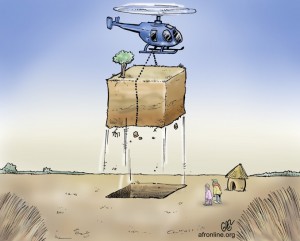Afronline | 24 October 2009
by Damien Glez
In Dakar in 2007 Nicolas Sarkozy stigmatized “The African”, left out of History. Just like to make a caricature, the French President made the picture of an African farmer, passively subjected to seasons’ cycle, closed into his life and his slice of land. However, the real situation could be much worse.
Many development experts have been launching the alarm for 18 months: numerous African farmers risk to lose their lands because of a new gold fever.
Korean societies buy hundreds of thousands land hectares. In Sudan many hedge funds from the U.S. are operating in the same way. There are African companies too that land in neighbourhood countries, as it is happening in the Democratic Republic of Congo, where numerous corporations from South Africa buy the arable lands.
In Stockholm, at the European Development Days, CTA has promoted a round table on the Global Land Acquisition, which is the real challenge.
In Africa land is holy. It is the tool for power and individual or community memory.
In Burkina Faso, in the most remote provinces, the Tengsoba’s words are a strong and respected sign. They are the heads of land. Landowners are the patrimonial cement into the families.
If the majority of sub-Saharan citizens are still rural, all of them claim its provincial roots. It is on the land that the first sip of millet beer is shed to nourish what has been buried there, outside cemeteries, in a farm that nobody has never imagined could be sold.
Agriculture and culture are strictly linked. The affection to land is so romantic that politicians started manipulating it. Ivorité emerges into the land problems in Ivory Coast and racial tensions are discovered behind a land reform in Zimbabwe.
When tradition is threatened by political and economic international interests, a war for land and water is at the doors.
Attracted by the bubble that has made food prices explode, speculation could give to the Mark Twain’s quote a kind of African atmosphere: “Buy land, they’re not making it anymore”.
Once again the African continent should have to face a natural resources’ curse. More impoverished than poor, Africa has been the stage of numerous battles for resources. From Chad and oil to Sierra Leone and diamonds, will we see agonizing the so-called “damned of the land”? What will remain after?
Formally, it is colonialism. Of course, agriculture needs investments, but the unbalanced relation in land negotiation is often in favour of buyers. Deals are often judicially incomplete. Populations are not part of this process and the traditional law is ignored. Agreements are not transparent.
Thanks to corruption and doubtful friendships, some land is sold for free. This is currently happening in Nigeria.
Unbeatable when they have to write down a contract, managers who become landowners often put at risk food security. Monoculture is privileged rather than biodiversity, which is necessary to face ecological challenges of the future. What will happen when biofuels will come?
It seems that starving Africa who sells its land for a fist of euros, is hiding what is located under its feet. Debates are rare, sellers are not sensitized, negotiators are badly advised and politicians do not talk about this problem.
The continent should already feel remorse for what it has not done in the case of cotton’s transformation. And what will Africa feel after its land is sold even before letting seeds grow?
The solution could be political. Good governance should lead to the adoption of a code for good practices in the land acquisition field. Experts of the World Bank are whispering it. Japan, a big importer of food, is suggesting it. Now it is up to African leaders to face the challenge. It is necessary condition for the hoped Green Revolution.
By Damien Glez for Afronline – Journal du Jeudi













